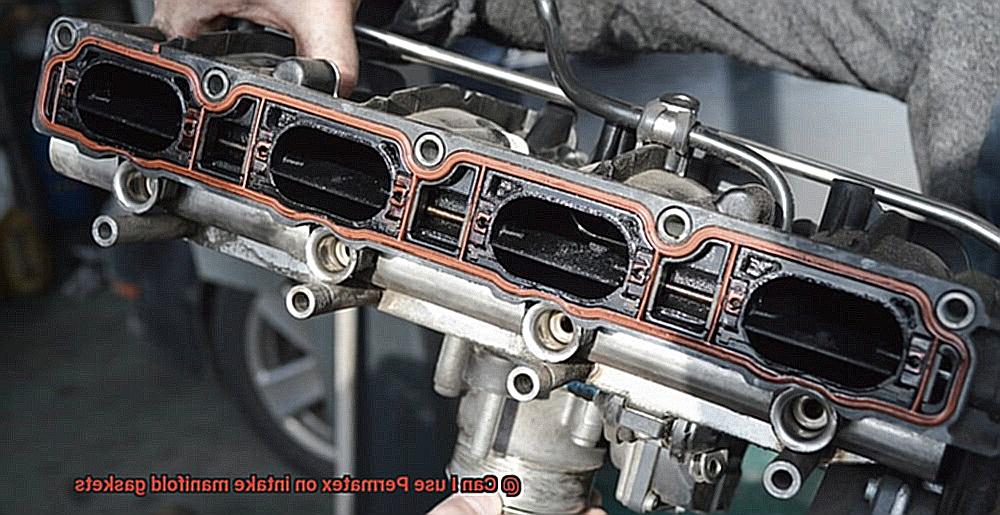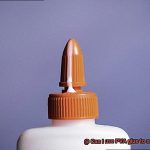You’re in a sticky situation (pun intended). You need to connect some electrical components or fix something delicate, and you’re wondering if superglue could do the trick instead of solder. Well, before you go reaching for that trusty tube of adhesive, let’s take a closer look at the pros and cons. In this blog post, we’ll dive into the nitty-gritty of using superglue as an alternative to solder, so you can make an informed decision that suits your needs.
Advantages of Superglue:
- Quick and easy application: Superglue is like lightning in a bottle – it’s fast and straightforward to use. No fancy equipment or specialized knowledge required. Just squeeze, stick, and voila. Perfect for those small tasks that need fixing in a jiffy.
- Versatility: Superglue is a true chameleon when it comes to materials. It can bond plastic, metal, ceramics – you name it. Heck, it even works on some electronic components too. Talk about being Jack-of-all-trades.
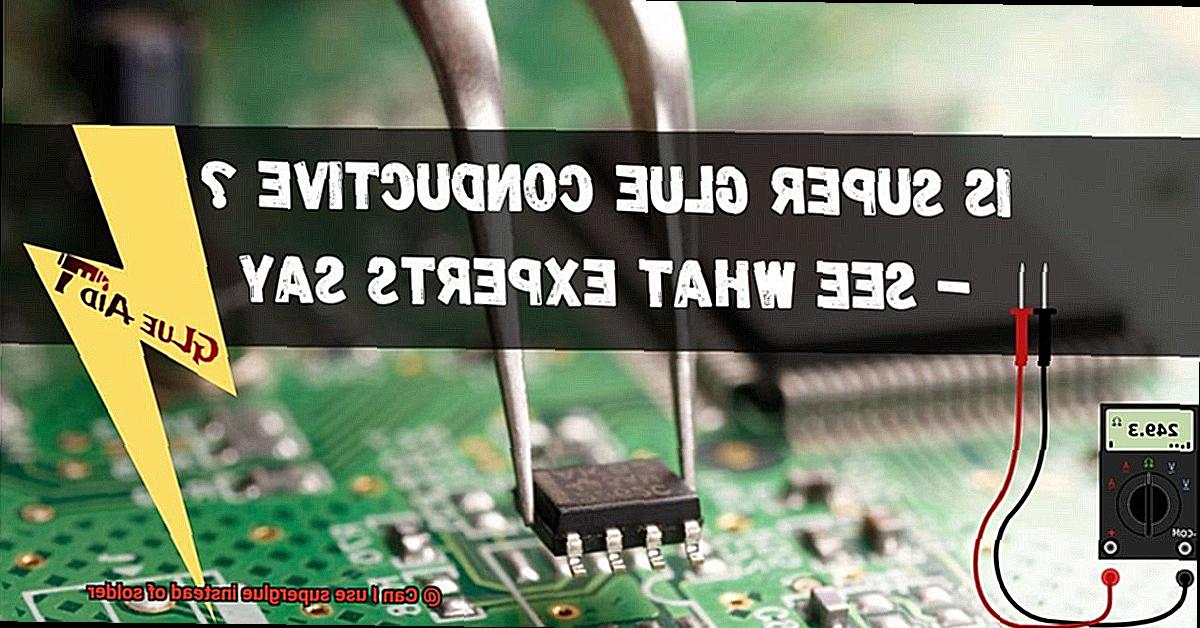
Disadvantages of Superglue:
- Electrical conductivity issues: Here’s where superglue falls short compared to solder – it’s not conductive. That means if you’re looking for a reliable electric connection, superglue might not be your best bet. Solder creates a low-resistance bond that ensures smooth current flow – something superglue just can’t replicate.
- Lack of strength in demanding situations: Sure, superglue holds things together pretty well… until things get tough. When faced with stress, heat, or vibrations (think cars or airplanes), superglue might buckle under pressure over time. It simply doesn’t have the same muscle as solder when it comes to mechanical strength.
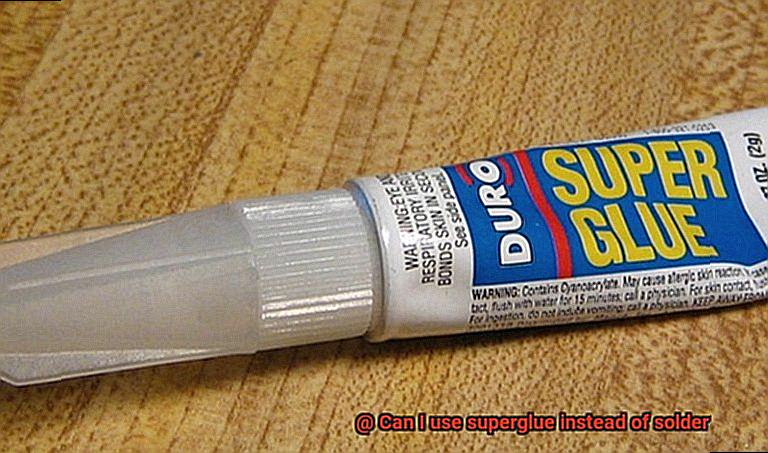
Advantages of Using Superglue Instead of Solder
Contents
- 1 Advantages of Using Superglue Instead of Solder
- 2 Disadvantages of Using Superglue Instead of Solder
- 3 When Should You Use Superglue Instead of Solder?
- 4 How to Properly Apply Superglue for Repairs
- 5 Electrical Connections: Should You Use Superglue or Solder?
- 6 Benefits of Using Soldering Over Superglue for Electrical Connections
- 7 Considerations When Choosing Between Superglue and Soldering
- 8 Conclusion
When it comes to bonding materials together, soldering has long been the go-to method. However, there are times when using superglue instead of solder can be advantageous. In this blog post, we will explore the various benefits of using superglue and why it can be a great alternative for certain applications.
Ease of Use and Cost-Effectiveness:
Superglue wins hands down when it comes to ease of use. No need for specialized tools or equipment – just a simple squeeze from the tube and you’re good to go.
On the other hand, soldering requires a soldering iron and solder wire, which can be intimidating for beginners. Additionally, superglue is more cost-effective as it is generally more affordable than soldering equipment.
Versatility and Quick Bonding:
Superglue can bond a wide range of materials – metals, plastics, ceramics, even certain types of wood. This versatility makes it convenient for various applications. Moreover, superglue offers rapid bonding capabilities. Apply it, wait a few minutes, and voila. A strong adhesive bond is formed, saving you precious time compared to soldering.
No Heat and Clean Application:
Unlike soldering that requires heat application, superglue does not need any heat source. This eliminates the risk of accidental burns or damage to delicate components. Additionally, superglue is applied in liquid form, allowing for precise and clean application. No more messy excess solder spreading or splashing.
No Specialized Skills Required and Portability:
Soldering requires practice and skill to create strong bonds, while superglue is straightforward and does not require specialized knowledge or training. This accessibility makes it ideal for beginners or those with little experience in soldering.
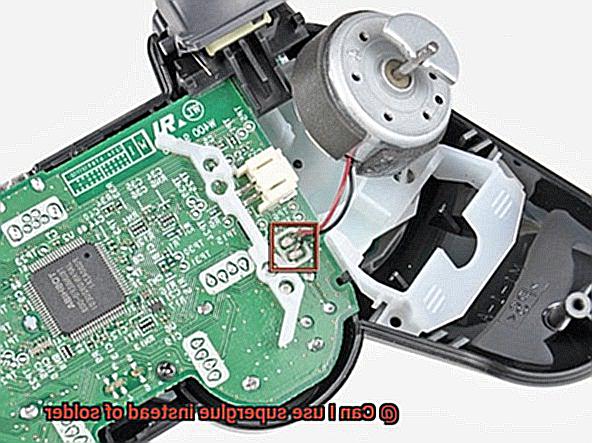
Furthermore, superglue comes in portable containers that can easily fit into a toolbox or pocket, making it convenient for repairs on the go or in tight spaces.
Disadvantages of Using Superglue Instead of Solder
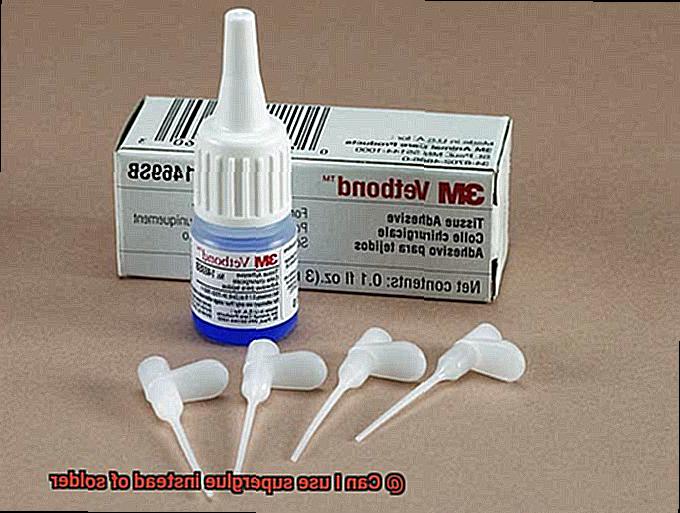
Using superglue instead of solder to join two objects together can have several disadvantages. These disadvantages include:
- Lack of conductivity: Superglue does not conduct electricity like solder does. This can lead to unreliable connections and potential issues with the functionality of electronic devices or circuits.
- Lack of flexibility: Solder joints allow for some movement, which is important in electronic devices that experience vibrations or thermal expansion. Superglue creates rigid bonds that do not provide the necessary flexibility, resulting in potential stress on components or wires and potential damage or breakage over time.
- Limited temperature resistance: Superglue has lower temperature resistance compared to solder. While solder can withstand high temperatures without losing its integrity, superglue may weaken or even melt under extreme heat. This makes it unsuitable for applications that involve heat-generating components or environments.
- Difficult to remove or repair: Superglue bonds are permanent and cannot be easily undone without potentially damaging components or wires. Unlike solder joints that can be reworked or desoldered, superglue can make troubleshooting or repairing electronic devices more challenging and time-consuming.
- Potential damage to components: Superglue is a strong adhesive that can seep into small cracks or crevices and potentially damage delicate electronic parts. Soldering allows for precise application without the risk of spreading adhesive where it shouldn’t be.
- Non-compliance with industry standards: Soldering is a commonly accepted method for creating reliable electrical connections, especially in professional electronics manufacturing. Using superglue instead of solder may not meet the necessary standards and can result in non-compliant or unsafe products.
When Should You Use Superglue Instead of Solder?
Superglue, also known as cyanoacrylate adhesive, is a versatile and powerful adhesive that can bond a wide range of materials together. While soldering is typically the go-to method for joining metals, there are certain situations where superglue may be a better choice. Let’s explore when and why you should consider using superglue instead of solder.
- Working with non-metallic materials: Superglue excels when working with materials like plastic or ceramic that can easily be damaged or melted by heat. Soldering requires heat, making superglue a safer and more suitable option for delicate objects.
- Small or intricate components: Superglue is ideal for working with tiny parts that require precision and control. Soldering can be challenging in these cases, whereas superglue allows for easier application and bonding, ensuring a secure connection without the risk of overheating or damaging the components.
- Time-sensitive projects or quick fixes: Superglue is the way to go if you’re in a hurry or need an instant fix. Soldering requires time to heat up the soldering iron and melt the solder, while superglue can be applied instantly. Whether you’re working on a time-sensitive project or need to make a temporary repair, superglue offers convenience and efficiency.
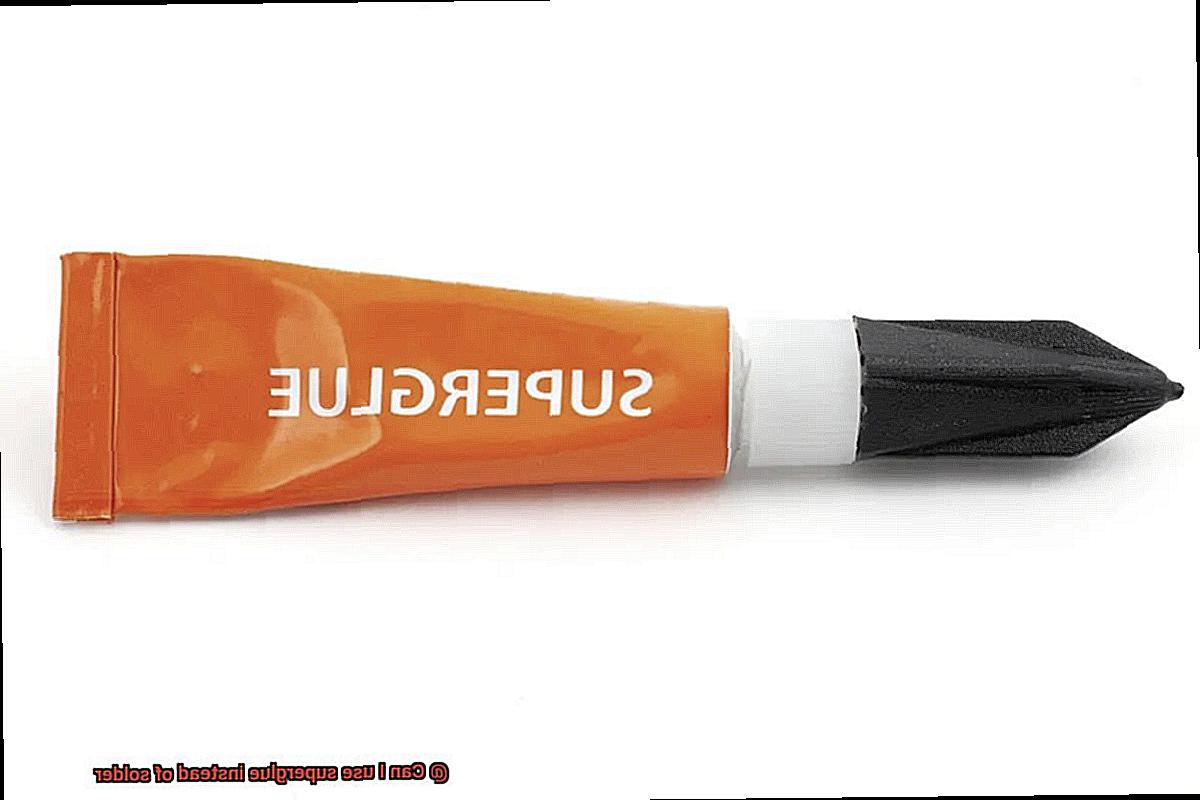
Electrical projects that don’t require high conductivity: While superglue may not provide the same level of conductivity as solder, it can still be suitable for certain electrical projects. If conductivity is not crucial, such as in non-critical wiring or circuitry, superglue can be used instead of solder.
Consideration of durability: It’s important to note that while superglue is known for its strong adhesive properties, it may not be as durable as a soldered joint. Solder creates a physical bond between metals, whereas superglue relies solely on the strength of the adhesive itself. In high-stress applications or situations where a long-lasting bond is needed, soldering would be the more reliable option.
How to Properly Apply Superglue for Repairs
Superglue, also known as cyanoacrylate adhesive, is a fantastic choice for quick and easy repairs. However, it’s important to know the right way to use it to ensure a successful and long-lasting fix. In this guide, we’ll explore the proper application of superglue for repairs, so you can tackle any broken objects like a pro.
Clean the Surfaces:
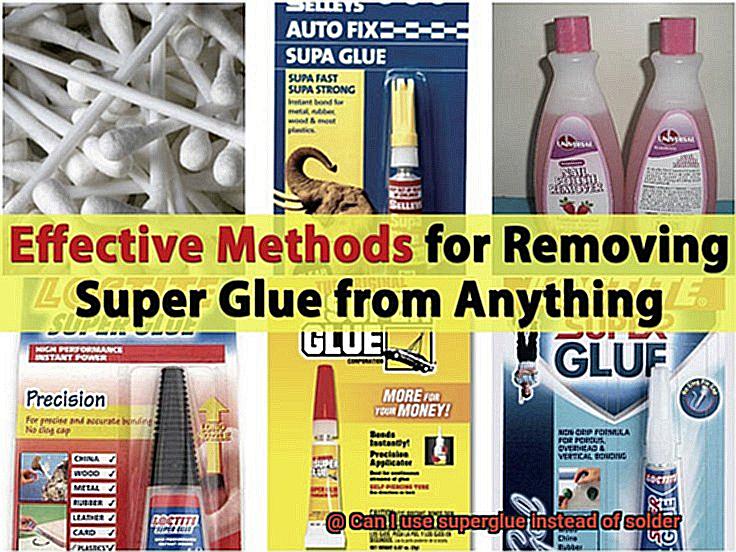
Before applying superglue, it’s crucial to clean the surfaces that need to be bonded. Dirt, oil, or debris can weaken the bond. Use a mild detergent or rubbing alcohol to thoroughly clean the surfaces and let them dry completely.
Roughen the Surfaces:
To enhance the strength of the bond, gently roughen the surfaces with sandpaper or a file. This creates a better surface for the glue to adhere to, ensuring a stronger and more durable repair.
Apply Sparingly:
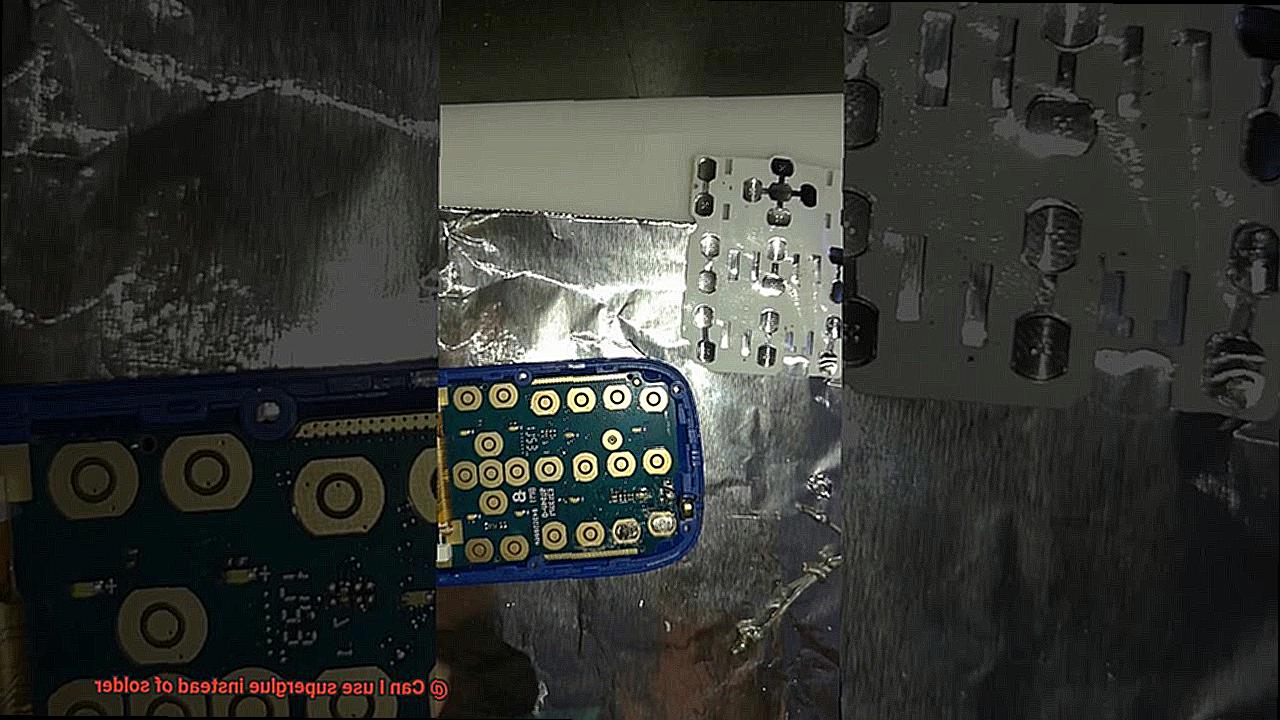
Remember, less is more when it comes to superglue. Apply a thin layer of glue evenly on one surface only. Using too much can result in excess glue oozing out and creating a messy appearance. A small amount of glue is usually sufficient for most repairs.
Join and Hold Firmly:
Quickly bring the two surfaces together after applying the glue, making sure to align them correctly. Press them firmly together and hold them in place for a few minutes to allow the bond to set. Applying pressure ensures a strong and secure adhesion.
Reinforce for Durability:
Superglue bonds can be strong but brittle. To increase durability, consider reinforcing the bond with additional materials like tape or wire. This provides extra support and prevents stress on the glue joint, making the repair more long-lasting.
Check and Reinforce if Needed:
After the glue has fully cured, inspect the bond for any weak spots or gaps. If necessary, apply additional layers of glue to reinforce those areas. Remember to follow the steps of cleaning, roughening, applying sparingly, and applying pressure.
Electrical Connections: Should You Use Superglue or Solder?
Making the right choice for electrical connections is essential for optimal performance and safety. Superglue and solder are two common methods, each with its own pros and cons. This article aims to provide a balanced overview of both options to help readers make an informed decision based on their specific needs.
Solder: The Preferred Option
- Reliable Conductivity: Solder ensures a continuous flow of electricity with its reliable and conductive connection. Loose or intermittent connections, which can cause electrical failures or safety hazards, are mitigated.
- Flexibility: Solder’s flexibility allows for movement and vibration without compromising the connection. This is crucial for applications subjected to frequent movement or mechanical stress.
- High-Temperature Resistance: Solder secures joints even under elevated temperatures, making it ideal for heat-generating applications. It ensures the integrity of the connection where heat is a concern.
- Reversible Connection: Soldering provides a reversible connection, allowing for easy disassembly without damaging components or wires. This flexibility is vital for repairs or modifications.
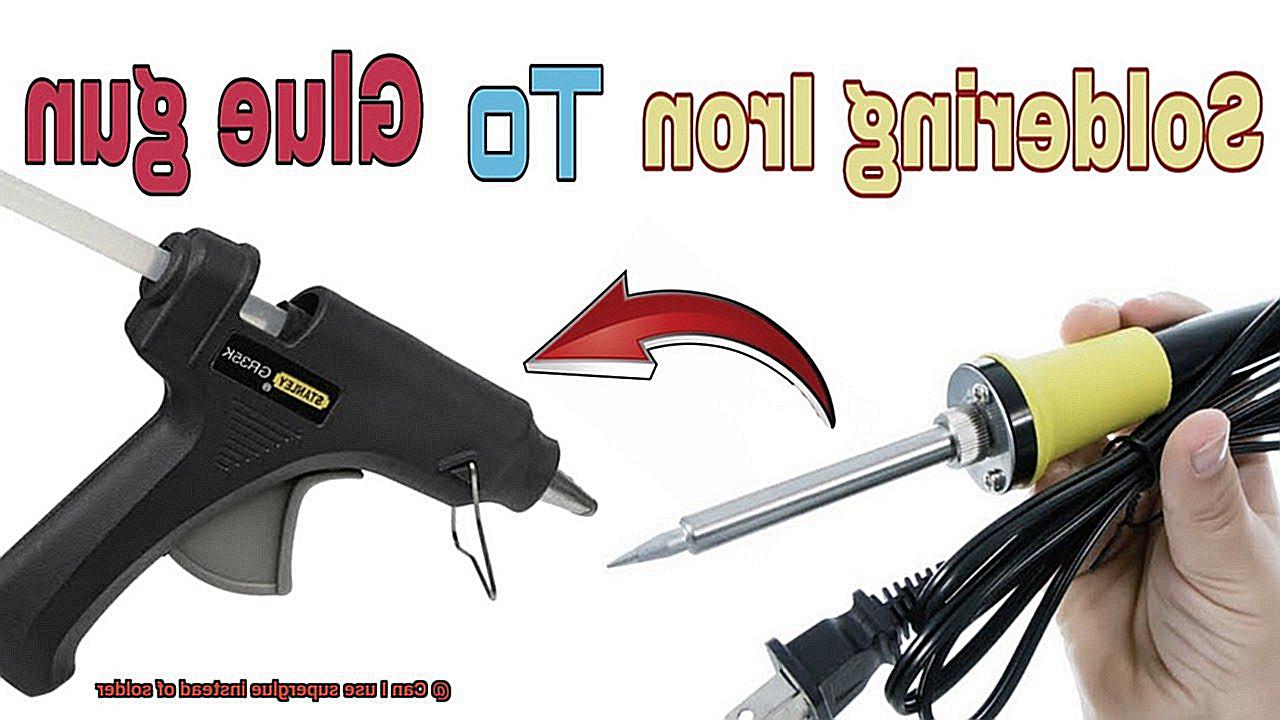

Superglue: Not Recommended for Electrical Connections
- Insufficient Conductivity: Superglue is an insulator, rendering it non-conductive. This can lead to poor conductivity and affect electrical circuit performance.
- Lack of Mechanical Strength: Superglue may not provide sufficient mechanical strength to withstand movement or vibrations over time. It can become brittle and crack under stress, resulting in weakened connections or complete failure.
- Limited Heat Resistance: Superglue is not designed to withstand high temperatures. Its use in heat-generating applications can compromise the adhesive properties, risking connection failure and safety hazards.
Benefits of Using Soldering Over Superglue for Electrical Connections
When it comes to electrical connections, the method you choose can make all the difference in performance and longevity. While superglue may seem like a quick fix, soldering is the superior choice. Let’s explore the benefits of using soldering over superglue for electrical connections.
First and foremost, soldering provides stronger and more reliable connections. Superglue simply isn’t designed to conduct electricity, so it can’t provide a consistent and stable connection. On the other hand, solder is specifically formulated to create a low-resistance pathway for current, ensuring a reliable flow.
Additionally, soldering allows for easy repairs and modifications. If a soldered connection becomes loose or needs to be changed, it can be easily desoldered and re-soldered without damaging the components. Superglue forms an unbreakable bond, making repairs more challenging and potentially damaging.
Efficient heat dissipation is another advantage of soldering. Electrical connections can generate heat, especially in high-power applications. Solder acts as a thermal conductor, efficiently dissipating heat away from the connection point. Superglue, being an insulator, can’t effectively dissipate heat, leading to potential overheating and damage.
Soldering also provides improved mechanical stability. When components are soldered together, the bond is strong and durable, able to withstand vibrations and movements without compromising the electrical connection. Superglue lacks this stability, risking disconnections in situations with constant movement or vibration.
Lastly, soldering allows for better precision and control. The process involves melting a specific solder alloy onto the joint, ensuring proper coverage and adhesion. This precise application minimizes excess material that could interfere with nearby components or cause short circuits. Superglue can be messy and imprecise, potentially damaging nearby components.
Considerations When Choosing Between Superglue and Soldering
When deciding between superglue and soldering, there are several key considerations to keep in mind.
Firstly, consider the type of materials you are working with. Superglue is suitable for bonding non-porous surfaces such as glass, plastic, and metal, while soldering is typically used for joining metals together. If you are working with non-metal materials, superglue may be the better option.
Secondly, consider the strength of the bond required. Superglue can create a strong bond between materials, but it may not be as durable or long-lasting as a soldered joint. If you need a bond that can withstand heavy loads or high temperatures, soldering is the way to go. Soldered joints provide a more secure and permanent connection, making them ideal for applications that require durability.
Another factor to consider is flexibility. Superglue tends to create a rigid bond, which may not be suitable for materials that need to move or flex. On the other hand, soldering allows for more flexibility in the joint, making it perfect for applications where movement or vibration is expected.
Cost is also an important consideration. Superglue is generally more affordable than soldering equipment, especially if you’re only working on small-scale projects. However, if you plan on frequently using soldering for various projects, investing in the necessary tools and materials might be a wise long-term investment.
Ease of use is another factor to consider. Superglue is relatively simple to use – just apply it to the surface, press the materials together, and voila. Soldering, on the other hand, requires more skill and practice. You’ll need to heat the solder and melt it onto the joint properly. So if you’re a beginner or prefer quick fixes, superglue might be your best bet.
Now let’s talk about environmental impact. Superglue often contains chemicals that can be harmful to humans and the environment. Additionally, it may not be biodegradable. On the other hand, soldering doesn’t usually involve toxic materials, making it a more eco-friendly choice.
To sum it all up, the choice between superglue and soldering depends on your specific project requirements. If you’re working with non-porous surfaces and need a quick bond, superglue is your go-to option. However, if durability, flexibility, and long-term use are what you’re after, soldering is the superhero you need.
xqiJ7kjr1O4″ >
Conclusion
In conclusion, while superglue can offer a convenient alternative to solder in certain situations, it’s crucial to carefully consider the pros and cons before making a decision. Superglue boasts quick and effortless application, the ability to bond various materials, and cost-effectiveness. It truly shines in small-scale projects, non-electrical repairs, or time-sensitive situations.
However, there are several drawbacks to using superglue instead of solder. Superglue lacks electrical conductivity, rendering it unsuitable for dependable electric connections. Moreover, it lacks the mechanical strength necessary for demanding applications involving stress, heat, or vibrations. Additionally, if repairs or modifications are needed, removing or fixing superglue can be challenging and may potentially harm delicate components.
When specifically contemplating electrical connections, soldering remains the preferred choice due to its reliable conductivity, flexibility under stress or movement, high-temperature resistance, and ease of reversibility for repairs or modifications.
Ultimately, the decision between superglue and solder hinges on the specific requirements of your project. If you’re working with non-metallic materials, seeking a quick fix or temporary bond, or don’t require high conductivity or durability, then superglue may prove suitable.

